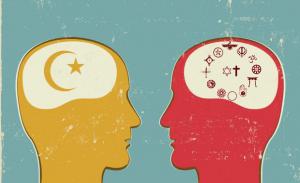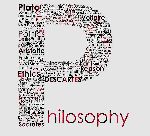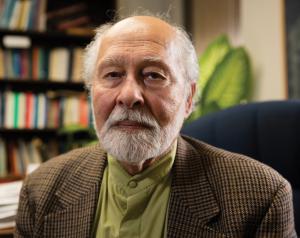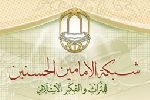Islamic Philosophy
The Soul-Body Problem In The Philosophical Psychology Of Mulla Sadra And Ibn Sina
- Published at
-
- Author:
- Dr. Shaykh Abbas Ali Shameli
- Source:
- www.al-islam.org

This paper will partly compare the approaches and ideas of two pioneers in Islamic philosophy in relation with the soul-body problem: the philosophical psychology of Mulla Sadra (Sadr al-Muta'allihin Shirazi 975-1050/1571-1640) and that of Ibn Sina (370-428/980-1037). Investigating the issue of the soul-body problem in the works of Mulla Sadra compared with those of Ibn Sina, we need firstly to gain a general perspective of their respective approaches to Islamic philosophical psychology. Such a perspective could help us to arrive at a more precise understanding of what each has contributed in this area and their differences.
Scripture, Science and Self in Islam
- Published at
-
- Author:
- Peter Ochs, Ph.D.
- Source:
- www.huffingtonpost.com
 What is Scripture? For the Muslim thinker Allama Muhammad Iqbal (1877-1938), founding poet of the nation of Pakistan, the answer concerns science as well as the Quran, reason as well as faith, poetry as well as prophecy. In his influential book of philosophy and faith, 'The Reconstruction of Religious Thought in Islam,' Iqbal called fellow Muslims to re-awaken both the rationality and the mysticism that is inherent in Quranic tradition. And that is the theme of this post: Iqbal's account of the central place of empirical study in the scriptural tradition of Islam.
What is Scripture? For the Muslim thinker Allama Muhammad Iqbal (1877-1938), founding poet of the nation of Pakistan, the answer concerns science as well as the Quran, reason as well as faith, poetry as well as prophecy. In his influential book of philosophy and faith, 'The Reconstruction of Religious Thought in Islam,' Iqbal called fellow Muslims to re-awaken both the rationality and the mysticism that is inherent in Quranic tradition. And that is the theme of this post: Iqbal's account of the central place of empirical study in the scriptural tradition of Islam.
IBN SINA: ABU ‘ALI AL-HUSAYN (980-1037) [Routledge]
- Published at
-
- Source:
- http://www.muslimphilosophy.com
![IBN SINA: ABU ‘ALI AL-HUSAYN (980-1037) [Routledge] IBN SINA: ABU ‘ALI AL-HUSAYN (980-1037) [Routledge]](../../english/images/menu/philosophy_and_mysticism/thm_philosophy_01.jpg) Ibn Sina (Avicenna) is one of the foremost philosophers in the Medieval Hellenistic Islamic tradition that also includes al-Farabi and Ibn Rushd. His philosophical theory is a comprehensive, detailed and rationalistic account of the nature of God and Being, in which he finds a systematic place for the corporeal world, spirit, insight, and the varieties of logical thought including dialectic, rhetoric and poetry.
Ibn Sina (Avicenna) is one of the foremost philosophers in the Medieval Hellenistic Islamic tradition that also includes al-Farabi and Ibn Rushd. His philosophical theory is a comprehensive, detailed and rationalistic account of the nature of God and Being, in which he finds a systematic place for the corporeal world, spirit, insight, and the varieties of logical thought including dialectic, rhetoric and poetry.
Mulla Sadra (Stanford Encyclopedia of Philosophy)
- Published at
-
- Source:
- http://plato.stanford.edu/entries/mulla-sadra/
 Sadr al-Din Muhammad b. Ibrahim b. Yahya Qawami Shirazi (ca. 1571–1636) is arguably the most significant Islamic philosopher after Avicenna. Best known as Mulla Sadra, he was later given the title of Sadr al-Muta’allihin (Master of the theosists) for his approach to philosophy that combined an interest in theology and drew upon insights from mystical intuition. He championed a radical philosophical method that attempted to transcend the simple dichotomy between a discursive, ratiocinative mode of reasoning and knowing, and a more intuitive, poetic and non-propositional mode of knowledge. He became famous as the thinker who revolutionized the doctrine of existence in Islamic metaphysics and extended the shift from an Aristotelian substance metaphysics to a (Neoplatonic) process metaphysics of change, from a metaphysics grounded in the primacy of substances as the stuff of existence to a metaphysics founded upon and moved by acts of being. A keen thinker who wrote works in philosophy, theology, mysticism, and scriptural exegesis, ...
Sadr al-Din Muhammad b. Ibrahim b. Yahya Qawami Shirazi (ca. 1571–1636) is arguably the most significant Islamic philosopher after Avicenna. Best known as Mulla Sadra, he was later given the title of Sadr al-Muta’allihin (Master of the theosists) for his approach to philosophy that combined an interest in theology and drew upon insights from mystical intuition. He championed a radical philosophical method that attempted to transcend the simple dichotomy between a discursive, ratiocinative mode of reasoning and knowing, and a more intuitive, poetic and non-propositional mode of knowledge. He became famous as the thinker who revolutionized the doctrine of existence in Islamic metaphysics and extended the shift from an Aristotelian substance metaphysics to a (Neoplatonic) process metaphysics of change, from a metaphysics grounded in the primacy of substances as the stuff of existence to a metaphysics founded upon and moved by acts of being. A keen thinker who wrote works in philosophy, theology, mysticism, and scriptural exegesis, ...
The Study of Islamic Philosophy
- Published at
-
- Author:
- Ibrahim Bayyumi Madkour, Translated by: Shahyar Sa'adat
- Source:
- www.al-islam.org
 For a long time Islamic philosophy was under a cloud of doubt and uncertainty. Some people denied its existence while others affirmed it. This uncertainty continued all through the nineteenth century. Those who denied the very existence of an Islamic philosophy feigned ignorance and maintained that the teachings of Islam opposed all free discussion and investigation, and therefore Islam has never risen to the aid of philosophy and science throughout the centuries of its existence.
For a long time Islamic philosophy was under a cloud of doubt and uncertainty. Some people denied its existence while others affirmed it. This uncertainty continued all through the nineteenth century. Those who denied the very existence of an Islamic philosophy feigned ignorance and maintained that the teachings of Islam opposed all free discussion and investigation, and therefore Islam has never risen to the aid of philosophy and science throughout the centuries of its existence.
Mystical Philosophy in Islam
- Published at
-
- Author:
- SEYYED HOSSEIN NASR
- Source:
- www.ismaili.net
 Mystical philosophy has an intimate connection with the mainstream of Islamic philosophy. It consists of several main strands, ranging from Isma'ili thought to the metaphysics of al-Ghazali and Ibn al-'Arabi, and with a continuing powerful presence in the contemporary Islamic world.
Mystical philosophy has an intimate connection with the mainstream of Islamic philosophy. It consists of several main strands, ranging from Isma'ili thought to the metaphysics of al-Ghazali and Ibn al-'Arabi, and with a continuing powerful presence in the contemporary Islamic world.
Ibn Sina’s Anticipation of Burdian and Barcan Formulas
- Published at
-
- Author:
- Zia Movahed
- Source:
- www.mullasadra.org
 Any system of modal logic without quantification is of interest only as a basis for a wider system including quantification. If such a wider system were found to be impossible, logicians would probably abandon modal logic entirely.
Any system of modal logic without quantification is of interest only as a basis for a wider system including quantification. If such a wider system were found to be impossible, logicians would probably abandon modal logic entirely.
Revisiting Averroes to Understand the “Other”
- Published at
-
- Author:
- Mohammed Abed Al Jabri
- Source:
- www.resetdoc.org
 The historical events that marked the years 1989-1990, the fall of the Berlin Wall and with it the Communist bloc, paved the way for radically new perspectives in schools of thought and the collective imagination. The famous statement made by former American President George Bush Sr. announcing the “end of the Cold War” and the birth of a “new world order” provided this perspective with an official seal of approval. The entire world expected a radical change in international relations. Hopes were expressed, optimistic forecasts were made; the “end of history” was even announced with the definitive triumph of liberalism and democracy.
The historical events that marked the years 1989-1990, the fall of the Berlin Wall and with it the Communist bloc, paved the way for radically new perspectives in schools of thought and the collective imagination. The famous statement made by former American President George Bush Sr. announcing the “end of the Cold War” and the birth of a “new world order” provided this perspective with an official seal of approval. The entire world expected a radical change in international relations. Hopes were expressed, optimistic forecasts were made; the “end of history” was even announced with the definitive triumph of liberalism and democracy.
Aristotelianism in Islamic philosophy
- Published at
-
- Author:
- KIKI KENNEDY-DAYCopyright © 1998, Routledge.
- Source:
- www.muslimphilosophy.com
 In Arabic, Aristotle was referred to by name as Aristutalis or, more frequently, Aristu, although when quoted he was often referred to by a sobriquet such as 'the wise man'. Aristotle was also generally known as the First Teacher. Following the initial reception of Hellenistic texts into Islamic thought in al-Kindi's time, al-Farabi rediscovered a 'purer' version in the tenth century. In an allusion to his dependence on Aristotle, al-Farabi was called the Second Teacher. Ibn Rushd, known in the West as Averroes, was the last great Arabophone commentator on Aristotle, writing numerous treatises on his works. A careful examination of the Aristotelian works received by the Arabs indicates they were generally aware of the true Aristotle. Later, transmission of these works to Christian Europe allowed Aristotelianism to flourish in the scholastic period.
In Arabic, Aristotle was referred to by name as Aristutalis or, more frequently, Aristu, although when quoted he was often referred to by a sobriquet such as 'the wise man'. Aristotle was also generally known as the First Teacher. Following the initial reception of Hellenistic texts into Islamic thought in al-Kindi's time, al-Farabi rediscovered a 'purer' version in the tenth century. In an allusion to his dependence on Aristotle, al-Farabi was called the Second Teacher. Ibn Rushd, known in the West as Averroes, was the last great Arabophone commentator on Aristotle, writing numerous treatises on his works. A careful examination of the Aristotelian works received by the Arabs indicates they were generally aware of the true Aristotle. Later, transmission of these works to Christian Europe allowed Aristotelianism to flourish in the scholastic period.
The Influence of Islamic Philosophy and Ethics on The Development of Medicine During the Islamic Renaissance
- Published at
-
- Author:
- Dr. Sharif Kaf Al-Ghazal
- Source:
- www.islamicmedicine.org
 Introduction
Although Islamic philosophy is of great diversity and richness, it is characterized by certain features that are of special significance for both an understanding of it and for an appraisal of its impact on the world at large.
Introduction
Although Islamic philosophy is of great diversity and richness, it is characterized by certain features that are of special significance for both an understanding of it and for an appraisal of its impact on the world at large.
5 Islamic Philosophers Every Muslim Must Read
- Published at
-
- Author:
- Muqtedar Khan
- Source:
- www.huffingtonpost.com
 Islamic intellectual culture suffers from a philosophy deficit. While there are a few philosophical thinkers in the Muslim World today none of them enjoys the rock star status that many pedestrian preachers and YouTube stalwarts enjoy. What this tells us is that people are beginning to value knowledge but are unable to distinguish between preaching and thinking.
Islamic intellectual culture suffers from a philosophy deficit. While there are a few philosophical thinkers in the Muslim World today none of them enjoys the rock star status that many pedestrian preachers and YouTube stalwarts enjoy. What this tells us is that people are beginning to value knowledge but are unable to distinguish between preaching and thinking.
The Islamic Concept of Knowledge
- Published at
-
- Author:
- Dr. Sayyid Wahid Akhtar
- Source:
- http://www.momin.com
 While it is an open question whether an explicit and systematically worked out Islamic epistemology exists, it is undeniable that various epistemological issues have been discussed in Muslim philosophy with an orientation different from that of Western epistemology.
While it is an open question whether an explicit and systematically worked out Islamic epistemology exists, it is undeniable that various epistemological issues have been discussed in Muslim philosophy with an orientation different from that of Western epistemology.
Islamic philosophy; An Introduction
- Published at
-
- Source:
- www.zeriislam.com
 Islamic philosophy (الفلسفة الإسلامية) is a part of the Islamic studies, and is a longstanding attempt to create harmony between faith, reason or philosophy, and the religious teachings of Islam.
Islamic philosophy (الفلسفة الإسلامية) is a part of the Islamic studies, and is a longstanding attempt to create harmony between faith, reason or philosophy, and the religious teachings of Islam.
The Meaning and Concept of Philosophy in Islam
- Published at
-
- Author:
- Seyyed Hossein Nasr
- Source:
- www.muslimphilosophy.com
 In the light of the Qur'an and Hadith in both of which the term hikmah has been used, 1 Muslim authorities belonging to different schools of thought have sought over the ages to define the meaning of hikmah as well as falsafah, a term which entered Arabic through the Greek translations of the second/eighth and third/ninth centuries. On the one hand what is called philosophy in English must be sought in the context of Islamic civilization not only...
In the light of the Qur'an and Hadith in both of which the term hikmah has been used, 1 Muslim authorities belonging to different schools of thought have sought over the ages to define the meaning of hikmah as well as falsafah, a term which entered Arabic through the Greek translations of the second/eighth and third/ninth centuries. On the one hand what is called philosophy in English must be sought in the context of Islamic civilization not only...
Methodology of Mulla Sadra
- Published at
-
- Source:
- http://www.mullasadra.org
 Mulla Sadra’s philosophical methodology can be inferred from what we have so far stated concerning his school of thought. In al-Asfar, his treatment of almost every problem, starts with a Peripatetic sketch. He then propounds the problem within the framework of the principles that conform to it in the Peripatetic school. Then he restates the different old and new ideas which are related to that problem. Following this, he rejects, modifies, confirms, or completes it, or presents a series of new and more comprehensive arguments. [1]
Mulla Sadra’s philosophical methodology can be inferred from what we have so far stated concerning his school of thought. In al-Asfar, his treatment of almost every problem, starts with a Peripatetic sketch. He then propounds the problem within the framework of the principles that conform to it in the Peripatetic school. Then he restates the different old and new ideas which are related to that problem. Following this, he rejects, modifies, confirms, or completes it, or presents a series of new and more comprehensive arguments. [1]
Books on Mulla Sadra
- Published at
-
- Source:
- http://www.mullasadra.org
 1. Ashtiyani, Jalal al-Din, Mulla Sadra’s Life and Philosophical Ideas, Tehran: Nihzat Zanan Musalman, 1981.
2. Al-i Yasin, J’afar, Sadr al-Din Shirazi Mujaddid al-Falsafah al-Islamiyyah, Baghdad: Matb’ah Ma’arif, 1996.
1. Ashtiyani, Jalal al-Din, Mulla Sadra’s Life and Philosophical Ideas, Tehran: Nihzat Zanan Musalman, 1981.
2. Al-i Yasin, J’afar, Sadr al-Din Shirazi Mujaddid al-Falsafah al-Islamiyyah, Baghdad: Matb’ah Ma’arif, 1996.
Mulla Sadra’s Books: A Bibliography
- Published at
-
- Source:
- http://www.mullasadra.org
 Mulla Sadra’s books can be divided into seven groups based on their subjects:
1. Literary Works
1.1. Diwan-i ash’ar (An Anthology of Poems): He has some scattered poems some couplets of which have been compiled by his student Fayd in a collection. This work has been found in possession of Haj Aqa Zia’ Ibn Haj Aqa Mahdi in Kermanshah.
Mulla Sadra’s books can be divided into seven groups based on their subjects:
1. Literary Works
1.1. Diwan-i ash’ar (An Anthology of Poems): He has some scattered poems some couplets of which have been compiled by his student Fayd in a collection. This work has been found in possession of Haj Aqa Zia’ Ibn Haj Aqa Mahdi in Kermanshah.
- «
- Start
- Previous
- 1
- Next
- End
- »


